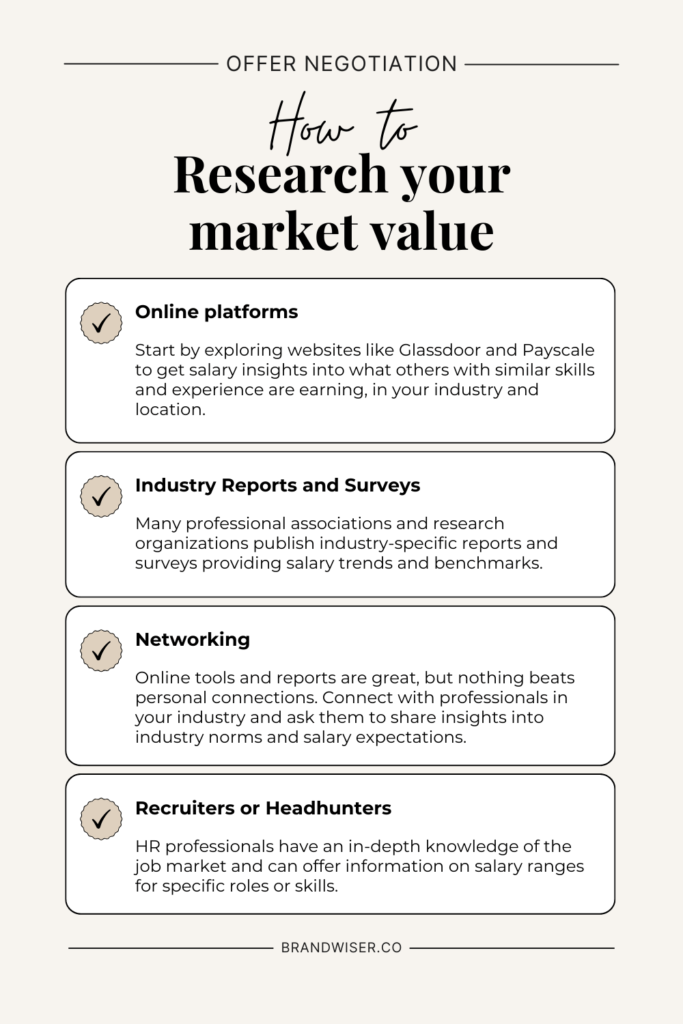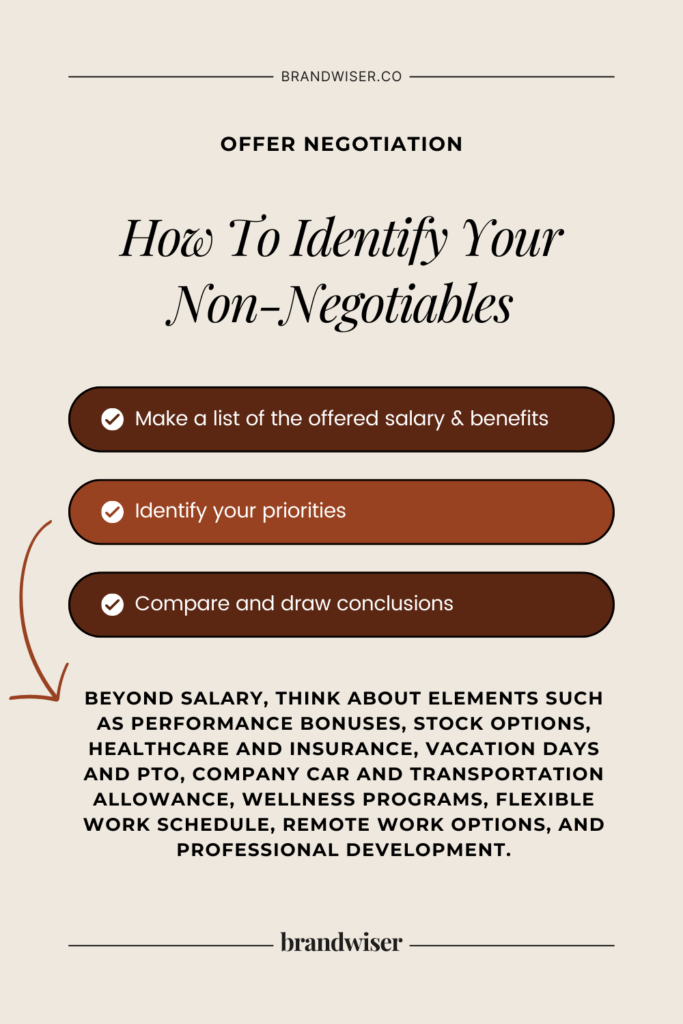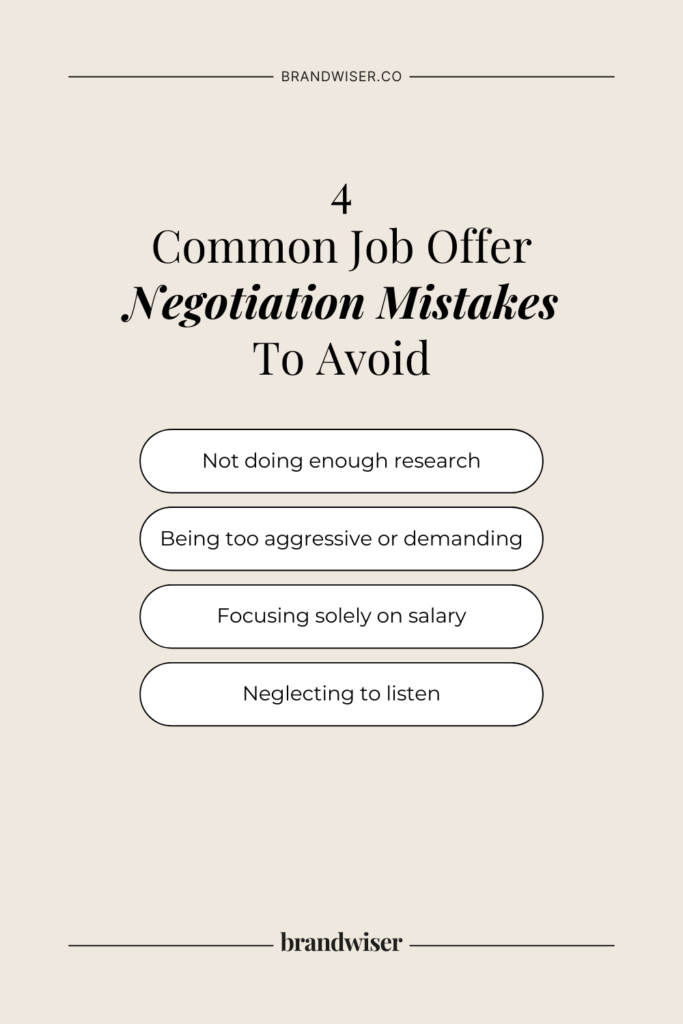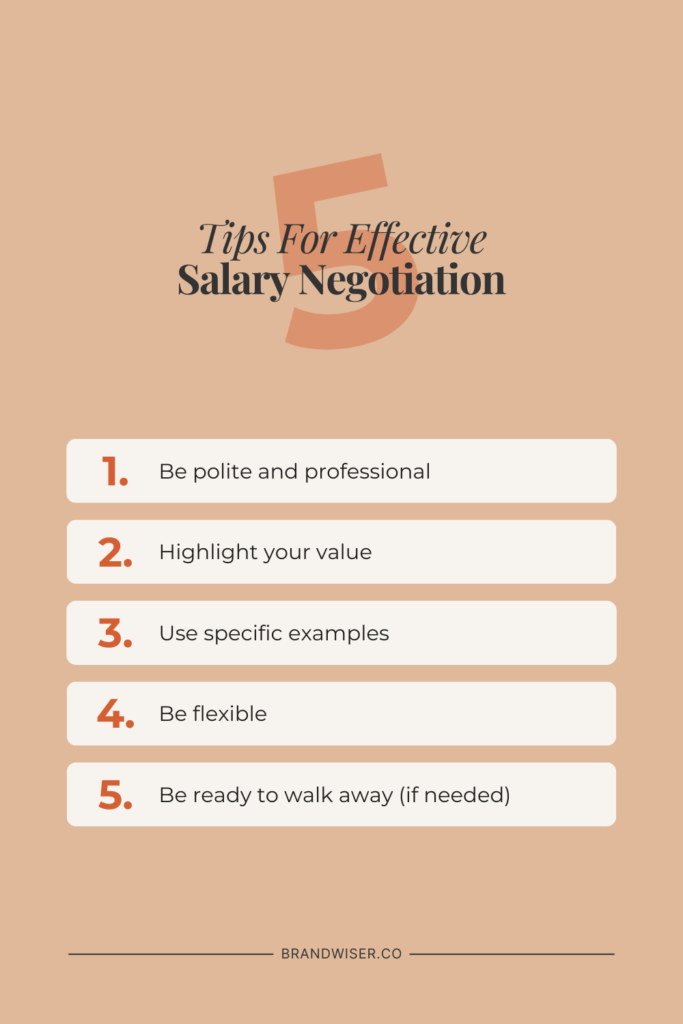After navigating the daunting, scary, sometimes even crazy —you know what I’m talking about— job search process, you have finally received a job offer. Congratulations! Now it’s time for the big question: should you negotiate or not?
And we’ll get to that. But first…
Did you know that according to Career Builder, more than half (55%) of job candidates do not try to negotiate their salary? At the same time, 73% of employers expect candidates to negotiate their offered salary.
So if employers expect it, why do candidates not do it?
It’s mostly because of fear. And I get it! Most of us were never taught how to negotiate, and the thought of it can be intimidating. But knowing that not negotiating your salary and overall package can cost you over $1 million throughout your career, you might want to change your approach.
In this article, I will guide you through 9 essential topics that will empower you to navigate offer negotiations with ease and confidence.
Table Of Contents
- The Importance of Negotiating a Job Offer
- Understanding Your Worth and the Market Value
- Identifying Your Non-Negotiables
- Developing Your Negotiation Strategy
- Negotiation Email Template
- Common Negotiation Mistakes to Avoid
- Tips for Effective Negotiation
- Handling Counteroffers and Negotiations
- Finalizing the Job Offer and Next Steps
The Importance of Negotiating a Job Offer
Before diving into the details on how to prepare, let’s address the “why”. Negotiating a job offer goes beyond just securing a higher salary; it’s about aligning the employment terms with your expectations and ultimately, your long-term career goals.
Many candidates avoid negotiations, fearing it might jeopardize the offer. But remember the data from the introduction? 73% of employers expect negotiation, and those who do negotiate earn higher salaries. Who wouldn’t want to be part of that successful group?
Negotiating isn’t just about money; it’s about setting the stage for a meaningful impact in your new role. It’s an important discussion that can help you ensure you start your new job on the right foot, and avoid potential future regrets.
Think of it as a conversation between you and the employer, where both sides aim for a win-win scenario. They want you in the team and they want you to be happy in the role. Having a satisfied employee that will not leave a few months after joining, is a win for them. Having a salary and package you are content with, is a win for you. See? Win-win!
Understanding Your Worth and the Market Value
Before you start negotiating, you need to know your numbers and have a clear understanding of your worth and the market value for your skills and experience.
Here’s how to do it:
- Online platforms: Start by exploring websites like Glassdoor and Payscale to get salary insights into what others with similar skills and experience are earning, in your industry and location.
- Industry Reports and Surveys: Online platforms are a good place to start, but don’t limit yourself to those. Many professional associations and research organizations publish industry-specific reports and surveys providing salary trends and benchmarks. Try to access those, and then move on to step 3 (which is my favorite!).
- Networking: Online tools and reports are great, but nothing beats personal connections. Connect with professionals in your industry and ask them to share insights into industry norms and salary expectations.
- Consult Recruiters or Headhunters: HR professionals have an in-depth knowledge of the job market and can offer information on salary ranges for specific roles or skills.
Based on your research, reflect on what you bring to the table and the unique value you can offer to the employer. This self-assessment will help you articulate your worth during the negotiation.

Identifying Your Non-Negotiables
Your salary is one part of the package, but to see the full picture, you need to also take into account all the other benefits and perks offered. They quickly add up.
Start by making a list of everything the offer includes beyond salary. Think about elements such as performance bonuses, stock options, healthcare and insurance, vacation days and PTO, company car and transportation allowance, wellness programs, flexible work schedule, remote work options, and professional development.
Once you have that list, it’s time to consider your priorities. What are your non-negotiables? Is a higher salary your main goal, or are other benefits equally important to you? How important is it to have flexibility or work from home? Do you care about wellness programs or having a company car? Identify the top three to five priorities that are crucial for your overall job satisfaction and write them down. If you want to take it one step further you can even assign a level of importance to each benefit.
Important: This part is not connected to what the company offers. This is all about what’s important to you. There may be elements important to you that the company doesn’t offer or are simply not included in the initial offer. (Hint: This is what you’re going to negotiate for.)
The last step is to compare the two lists and reach your conclusions. What does the company offer? What are your non-negotiables? Are there areas where you are willing to be flexible? Based on that, you’ll be able to identify the specific benefits you’d like to negotiate.
So to summarize:
- Make a list of the offered salary and benefits
- Identify your priorities
- Compare and draw conclusions

Developing Your Negotiation Strategy
Now that you have completed the 2 crucial points in preparing to negotiate an offer (understanding your worth and identifying your non-negotiables), you are ready to develop your negotiation strategy.
You know the unique value you bring (your hard and soft skills) and what these skills are worth in the market (insert number here)! You also know what’s important to you in your career.
Now it’s time to set clear goals and define your ideal outcome. Determine your target salary and specific benefits you want to negotiate for. It’s also helpful to establish a fallback position, so you know your limits and when to walk away if the offer doesn’t meet your expectations.
Lastly, determine your communication approach. Will you email them, have a phone call, or opt for a face-to-face meeting? Each has its own benefits. While email provides a written record and time to think through your responses, a phone call or face-to-face meeting can build a more personal connection. Choose the method that aligns with your comfort level and the relationship you have built with the employer.
Negotiation Email Template
Thank you so much for the offer! I’m excited about the opportunity to join the team as a [Job Title] and contribute my skills and experience to the company.
However, after careful consideration, I would like to respectfully ask for a higher salary for the position. According to my research, the average salary for the role is [Average salary], with salaries ranging from [Lowest in the range] to [Highest in the range].
Could you please consider moving the offer closer to [Proposed salary], which seems more appropriate for someone with my experience and proven skill set?
I understand that the initial offer may already have been set and approved, but I hope you will consider my request. I would be happy to discuss my reasons for this request in more detail during a phone call or in-person meeting.
Thank you for your consideration. I look forward to joining the team and contributing to [Company]‘s success.
Sincerely,
[Your Name]
📌 Note: If you’ve been reading my posts you’ll know I often share examples and templates. It’s important to use them as inspiration and tailor them to match your unique personality, the culture of the company you’re applying to, and the individual you are addressing within the hiring team.
Common Negotiation Mistakes to Avoid
Negotiating a job offer can be nerve-wracking, but like any skill, it becomes more comfortable with practice and thorough preparation. Between the fear of rejection, lack of confidence, conflict avoidance, and cultural norms —yes, some or all apply depending on your specific situation—, it’s easy to make mistakes. Here are a few pitfalls to avoid:
- Not doing enough research: Research is the first and most crucial part. Failing to research industry standards and the company’s compensation practices can put you at a disadvantage during negotiation.
- Being too aggressive or demanding: I know you just want to get what you’re worth, but adopting an aggressive approach can damage the relationship with the employer. And you don’t want that, as if all goes well, you’ll end up working with them. You want to maintain a professional and respectful tone throughout the negotiation.
- Focusing solely on salary: While salary is important, remember to consider the overall compensation package, including benefits and perks.
- Neglecting to listen: It’s time to practice your active listening skills. Pay attention to the employer’s concerns and be open to finding common ground. Remember it’s all about finding a win-win situation.

Tips for Effective Negotiation
Now that you know what mistakes to avoid, here are some additional tips to help you navigate the process effectively:
- Be polite and professional: Maintain a respectful tone throughout the negotiation. Remember that you’re looking for a win-win situation.
- Highlight your value: Emphasize the unique skills and experiences you bring to the table. Showcase your achievements and how they will benefit the company. Use data from your research to make a point of why they should offer what you’re asking for.
- Use specific examples: Support your requests with quantifiable data and specific examples from your work experience. This can help justify your position and show that you have done your research.
- Be flexible: While it’s important to have clear goals, be open to compromise. Consider alternative forms of compensation or benefits that may be valuable to you.
- Be ready to walk away: Define what your “limits” are, and be ready to walk away if the discussions do not bring a positive result and the offer doesn’t meet your expectations.

Handling Counteroffers and Negotiations
You did your research, identified your non-negotiables, decided on what you wanted to negotiate, customized the email template, and sent it to the employer. What happens next?
- Acceptance: The employer may agree to your proposed terms, indicating their willingness to meet your expectations. Congratulations! It wasn’t that hard after all, was it?
- Counteroffer or alternative proposals: The employer may respond with a counteroffer or provide alternative solutions or benefits. Carefully review the proposal to assess its impact on your priorities before responding. If the proposal is not satisfactory, you can respectfully decline and restate your initial requests.
- Rejection: Not an ideal scenario, but in some cases, the employer may reject your initial proposal outright. This doesn’t necessarily close the door to negotiations; depending on their reasoning, it can prompt a discussion to understand their concerns and find a middle ground.
Regardless of how the first contact with the employer to negotiate goes, remember that negotiation is a collaborative process, and finding a mutually beneficial solution should be the ultimate goal.
Finalizing the Job Offer and Next Steps
The last and most exciting part of the process; accepting the offer. If all goes well, the employer with either accept the terms you suggested or will send a revised offer the terms of which you are happy to accept.
Before accepting the offer, review it carefully, ensuring that all the negotiated terms are accurately reflected. Seek clarification on any ambiguous points and ask for written confirmation of the agreed-upon terms. Express your gratitude for the opportunity and your enthusiasm for joining the company. Finally, follow up with any necessary paperwork or documentation to formalize your acceptance. Congratulations!
TL;DR:
Negotiating a job offer is crucial, yet over half of job candidates avoid it due to fear. This article guides you through understanding the importance of negotiation, knowing your worth, identifying non-negotiables, and developing an effective negotiation strategy. It covers the entire negotiation process, from handling counteroffers to finalizing the job offer and emphasizes the significance of creating a win-win scenario for both you and the employer.
